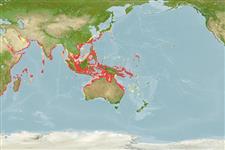Issue
nomen dubium: Sparks (2006) indicated that the designation of the lectotype(s) by Jones (1985) and Bauchot and Desoutter (1989) must be invalid because the lectotype was probably chosen from incorrect syntypes (see ICZN 1999: MNHN A.6738 with 2 specimens, MNHN A.6739, MNHN 1988-397, and MNHN 1988-328 measure too small, 26-46 mm SL, and are not correct syntypes). Valenciennes in Cuvier and Valenciennes 1835 stated clearly in the original description of Equula lineolata, ‘‘Nos individus sont longs de trois pouces (Our specimens are three inches in length)’’. Thus, the lectotype(s) designated are totally invalid, and it is impossible to identify Equula lineolata accurately for no type specimens could be found and the original description was incomplete (Ref. 120651).
Environment: milieu / climate zone / depth range / distribution range
Ecology
Marine; demersal; depth range 20 - 50 m (Ref. 28016). Tropical; 36°N - 31°S, 30°E - 169°E
Indo-West Pacific: Durban, South Africa (Ref. 11228), Madagascar and Pakistan to the Philippines, north to southern Japan (Ref. 559), south to northeast Australia.
Size / Weight / Age
Maturity: Lm ? range ? - ? cm
Max length : 15.0 cm TL male/unsexed; (Ref. 5450)
Found in coastal waters. Stays near the substrate and feeds on fish, crustaceans, chaetognaths, nematodes, bivalves, and gastropods (Ref. 5213).
Life cycle and mating behavior
Maturities | Reproduction | Spawnings | Egg(s) | Fecundities | Larvae
James, P.S.B.R., 1984. Leiognathidae. In W. Fischer and G. Bianchi (eds.) FAO species identification sheets for fishery purposes. Western Indian Ocean (Fishing Area 51). Vol. 2. FAO, Rome. pag. var. (Ref. 3424)
IUCN Red List Status (Ref. 130435)
Threat to humans
Harmless
Human uses
Fisheries: commercial
Tools
Special reports
Download XML
Internet sources
Estimates based on models
Preferred temperature (Ref.
123201): 24.1 - 28.6, mean 27.6 °C (based on 318 cells).
Phylogenetic diversity index (Ref.
82804): PD
50 = 0.5010 [Uniqueness, from 0.5 = low to 2.0 = high].
Bayesian length-weight: a=0.00661 (0.00446 - 0.00978), b=3.18 (3.07 - 3.29), in cm total length, based on LWR estimates for this species (Ref.
93245).
Trophic level (Ref.
69278): 3.5 ±0.50 se; based on food items.
Resilience (Ref.
120179): High, minimum population doubling time less than 15 months (K=1.05-2.83).
Fishing Vulnerability (Ref.
59153): Low vulnerability (13 of 100).
